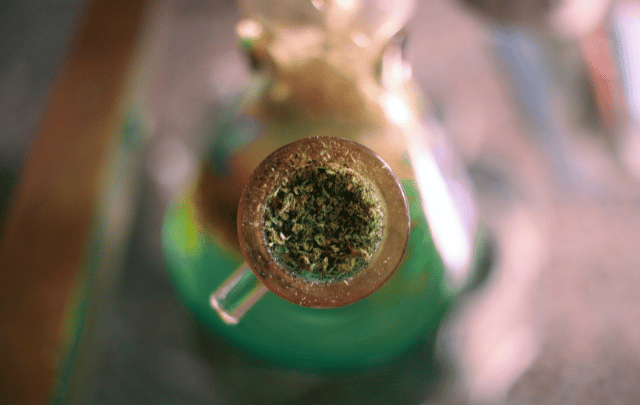Does Weed Cause Acne? Exploring the Link and Solutions
Does weed cause acne? While scientific evidence is limited, some users report that smoking weed worsens their acne. This article explores how weed may impact sebum production and inflammation, offering tips to manage acne if you use marijuana.
Key Takeaways
Smoking weed can increase sebum production and inflammation, leading to acne breakouts, although individual responses may vary.
Dietary habits, personal hygiene, and stress management play critical roles in managing acne among marijuana users.
CBD may offer potential benefits for skin health, as it has anti-inflammatory properties, but THC can exacerbate acne and skin issues.
The Relationship Between Smoking Weed and Acne Breakouts
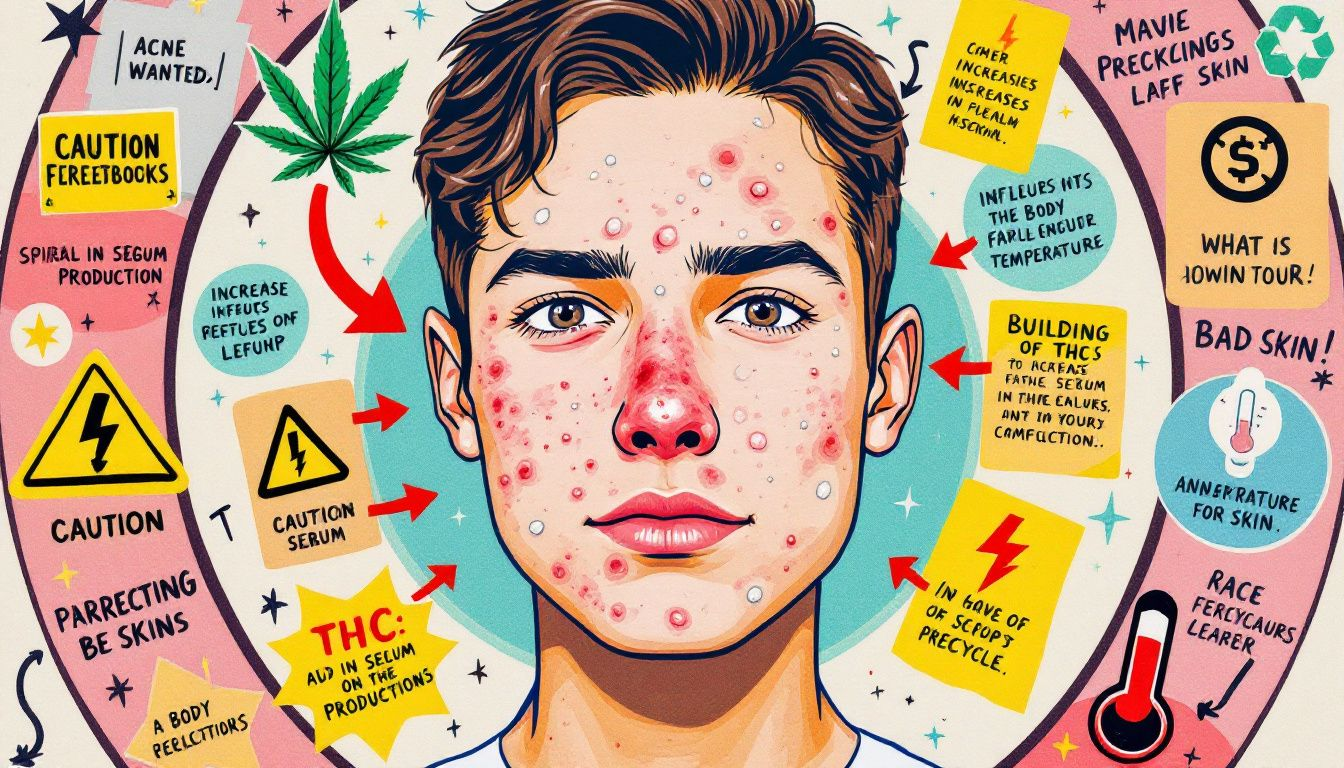
Smoking weed can exacerbate existing acne and potentially lead to new breakouts due to its various effects on the skin. While some individuals report an increase in acne when they smoke weed, this response can vary greatly among users. Understanding these individual responses is important because not everyone will experience increased acne with marijuana use.
Although there is currently insufficient scientific evidence directly linking smoking weed to the development of acne, it is important to consider how smoking weed cause acne might contribute to skin issues through mechanisms related to inflammation and sebum production. Factors beyond smoking weed, such as diet and personal hygiene, also play a significant role in acne development. For those concerned about acne, moderating cannabis use or abstaining altogether might help prevent breakouts.
Learning how cannabis interacts with sebaceous gland activity and inflammation helps grasp its effects on skin health. We will delve into the hormonal changes from marijuana use, the role of sebum production, and the impact of inflammation on skin health.
Hormonal Changes from Marijuana Use
Marijuana use influences the hypothalamus, which plays a critical role in hormone regulation. Smoking weed can lead to alterations in hormonal levels, including increases in testosterone and changes in progesterone and estrogen levels. These hormonal imbalances can overactivate sebaceous glands, resulting in a higher probability of acne development.
The hormonal changes induced by marijuana use can disrupt the body’s natural balance, leading to various skin issues. Marijuana users need to comprehend these hormonal impacts to manage their skin health effectively. Noticing negative skin reactions might warrant considering the hormonal effects of cannabis consumption.
Sebum Production and Clogged Pores
Smoking weed can lead to increased sebum production, which is a key factor in acne formation. THC, the active component in marijuana, increases the activity of sebaceous glands, resulting in the production of more oil. This overproduction of sebum, along with irregular shedding of skin cells, significantly contributes to acne breakouts.
Additionally, long-term cannabis use often results in dehydration, which can exacerbate skin issues. The combination of increased sebum production and dehydration can create a perfect storm for clogged pores and acne development.
Staying hydrated and following a balanced skincare routine can mitigate these effects.
Inflammation and Skin Health
Cannabis smoke may exacerbate skin inflammation. Inflammation is a key trigger for acne flare-ups, and exposure to cannabis smoke can intensify this condition. THC might promote inflammation, worsening acne and complicating skin health.
For those with inflammatory skin diseases, marijuana use can potentially worsen these conditions. Adopting a healthy lifestyle and minimizing exposure to cannabis smoke can improve skin health and lower the risk of acne breakouts.
Behavioral Factors Influencing Acne
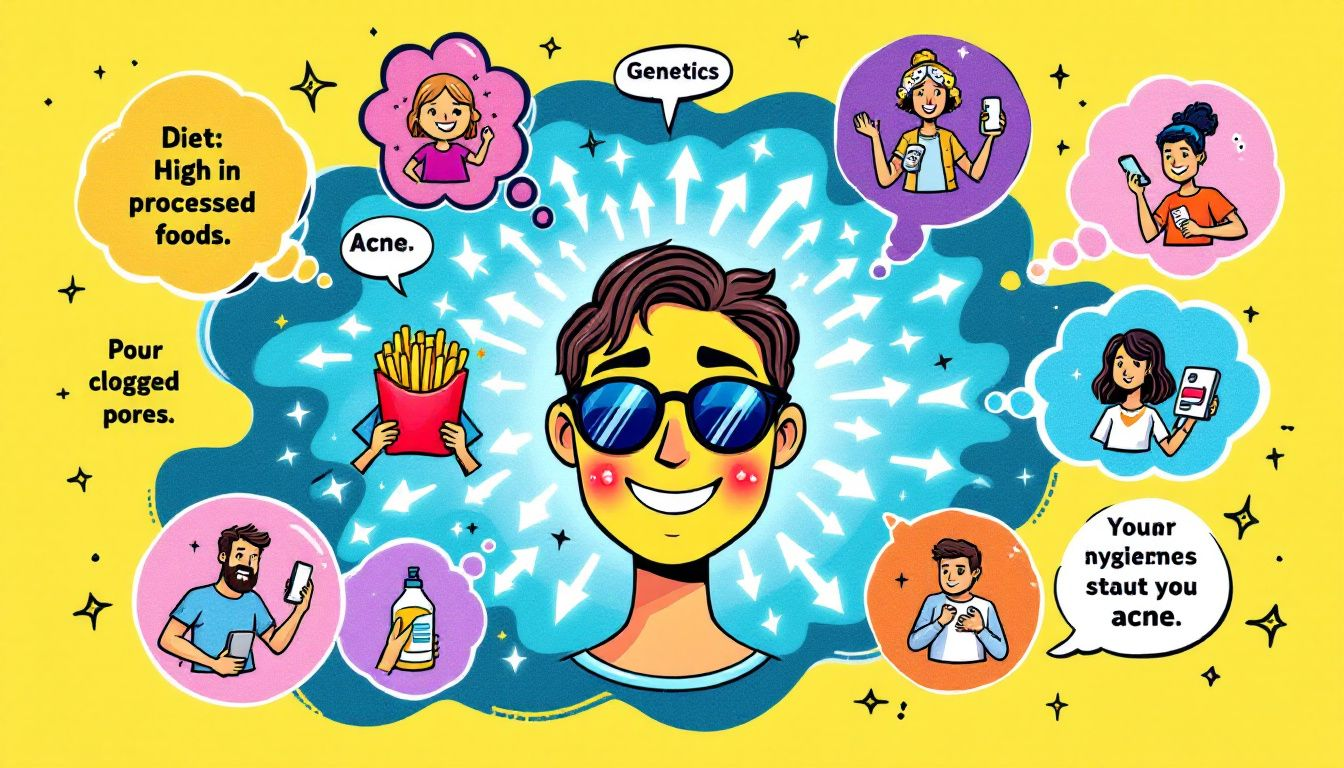
Beyond the direct effects of smoking weed, behavioral factors play a significant role in acne development. Changes in dietary habits, personal hygiene, and sleep patterns can all influence skin health. Marijuana users may face additional health risks, such as Cannabis Use Disorder and increased mental health concerns, which can also impact skin health.
Recognizing these behavioral influences is key to managing acne. We will explore how dietary habits, personal hygiene, and sleep patterns contribute to acne and provide practical advice for marijuana users to maintain healthy skin.
Dietary Habits and Unhealthy Foods
Marijuana users often consume high-fat and sugary foods after smoking marijuana, which can elevate blood sugar and aggravate acne. Cravings induced by marijuana frequently include unhealthy snacks, contributing to skin issues by heightening inflammation.
A balanced diet low in sugar and refined carbs can help reduce the risk of acne in marijuana users. Choosing nutritious foods over heavily processed options leads to healthier skin and fewer breakouts.
Hormonal imbalances from marijuana can enlarge sebaceous glands, leading to excessive oil production and acne.
Personal Hygiene and Skincare Routine
Regular cannabis consumption can alter hygiene practices, leading to neglect in personal care. This neglect can worsen existing acne and contribute to new breakouts. Good hygiene, including regular skin cleansing, is vital for marijuana users to manage acne.
Proper skincare can mitigate the negative effects of cannabis use on skin health.
Sleep Patterns and Stress Levels
Chronic cannabis use can disrupt sleep quality, which is vital for maintaining healthy skin. Research suggests that users may be more likely to experience sleep problems, affecting hormone levels and skin health.
Stress-relief techniques and a consistent sleep schedule can significantly improve skin health.
Smoke Exposure and Its Impact on Skin
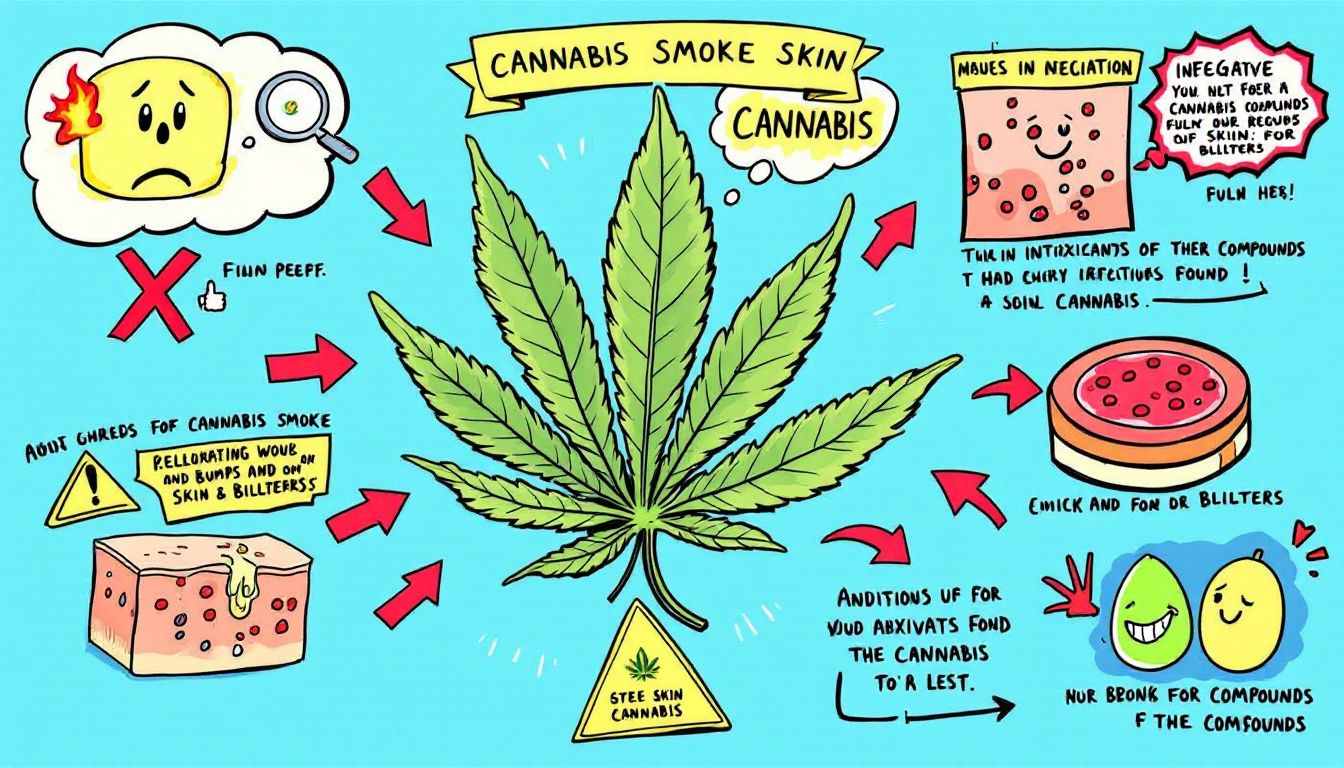
Cannabis smoke exposure can have detrimental effects on skin health. Smoke irritates the skin and can exacerbate acne and other inflammatory skin diseases. Second-hand smoke from marijuana can lead to increased skin inflammation and worsen acne conditions.
Recognizing the physical effects of cannabis smoke and the long-term skin damage it can cause is crucial for those concerned about their skin health. We will explore these impacts in detail.
Physical Effects of Cannabis Smoke
Cannabis smoke irritates the skin and can exacerbate existing acne. Smoking weed can worsen skin problems, including acne and inflammation. Cannabis smoke exposure increases skin inflammation, worsening existing acne. Long-term cannabis use can lead to dehydrated skin, which subsequently increases sebum production and contributes to acne.
Using a gentle exfoliating product regularly can help remove dead skin cells and prevent clogged pores. Regular skincare, such as cleansing and moisturizing, is crucial to prevent clogged pores and breakouts.
Long-term Skin Damage
Long-term cannabis smoke exposure is associated with accelerated skin aging. It reduces collagen production, impacting skin elasticity. Daily cannabis use can reduce collagen levels, affecting skin elasticity.
Thus, long-term exposure to cannabis smoke can cause premature skin aging.
Potential Benefits and Risks of Cannabis for Skin Health
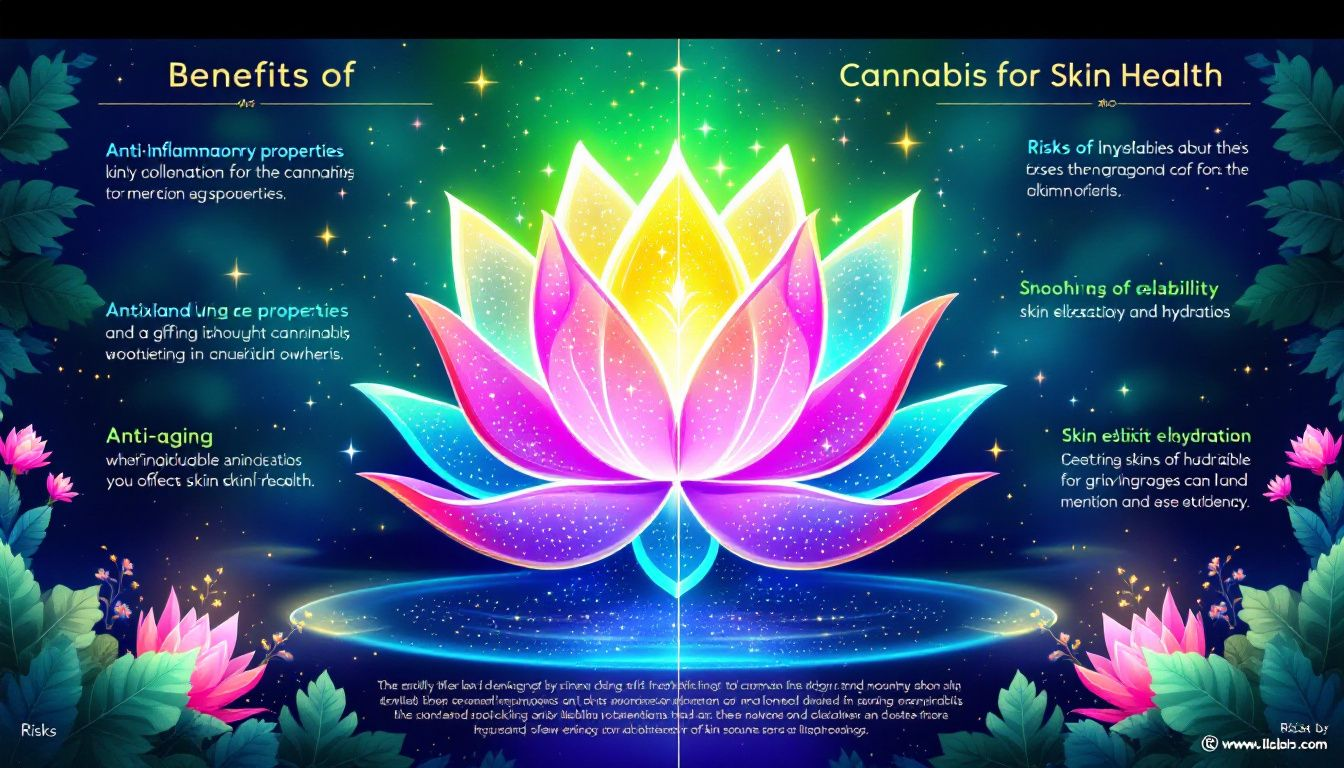
While cannabis can have negative effects on skin health, its components, particularly CBD, also offer benefits. Research indicates that cannabinoids might be effective in treating various skin diseases, including acne and eczema. However, it is important to consider the potential risks associated with cannabis use.
We will explore the anti-inflammatory properties of CBD and the adverse effects of THC on skin health.
Anti-inflammatory Properties of CBD
CBD has been shown to inhibit the production of pro-inflammatory cytokines, potentially alleviating conditions like acne. Topical cannabidiol is effective in reducing inflammation, which can help in managing acne.
Using skincare products infused with CBD can help balance sebum production and prevent clogged pores. CBD’s anti-inflammatory properties might help reduce skin inflammation and improve overall skin conditions.
Adverse Reactions and Negative Effects
The use of THC may counteract the potential skin benefits of cannabis and can contribute to acne development. Critics argue that the adverse effects of cannabis usage on skin health can be more detrimental than any possible benefits.
Practical Tips for Marijuana Users to Manage Acne
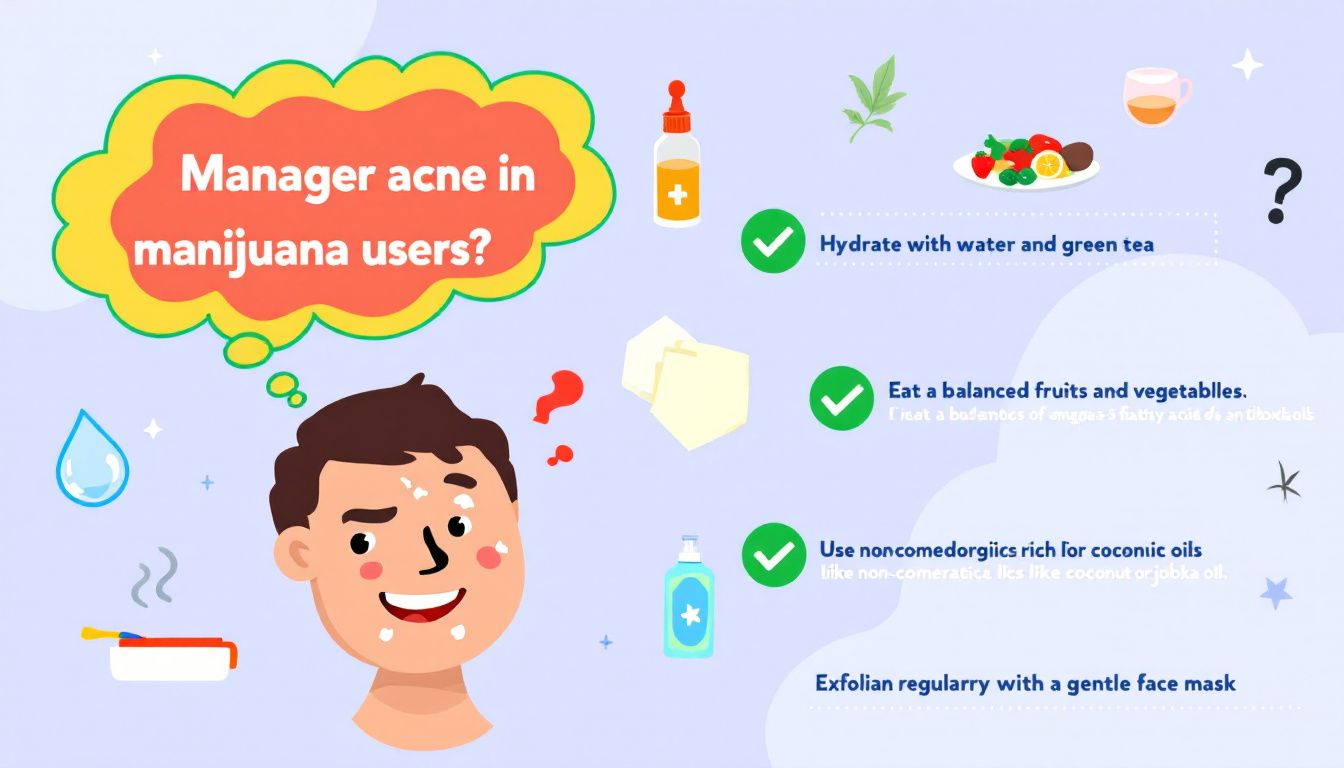
For those who continue using marijuana, practical steps can help manage acne. Good hygiene, including a regular skincare routine, is essential for preventing acne breakouts and can trigger acne breakouts, especially for marijuana users.
A balanced diet and avoiding unhealthy foods, such as those high in sugar and processed ingredients, can significantly affect acne management. Managing stress through techniques like meditation or exercise can reduce the likelihood of acne breakouts related to marijuana use.
Maintaining a Healthy Diet
A nutrient-rich balanced diet can help regulate oil production and improve overall skin health. Avoiding processed foods and sugary snacks is key to maintaining healthy skin and preventing acne.
Establishing a Skincare Routine
Having a proper skincare routine is essential for preventing clogged pores and maintaining overall skin health. Neglecting personal hygiene and skincare routines due to marijuana use can exacerbate existing acne.
A consistent skincare routine and prioritizing personal hygiene can greatly improve skin health and reduce acne risks.
Managing Stress and Sleep
Healthy sleep patterns and stress management are essential for maintaining skin health and reducing acne flare-ups. Relaxation techniques such as mindfulness or yoga can alleviate stress, positively affecting skin health.
When to Seek Professional Help
Consulting a healthcare professional or dermatologist provides personalized advice for acne related to marijuana use. Persistent acne that doesn’t respond to over-the-counter treatments warrants a dermatologist consultation. Those experiencing severe acne symptoms should seek professional evaluation to prevent scarring.
Those experiencing body acne should consider professional advice, especially if it’s severe or recurrent. Consult a dermatologist if acne persists despite over-the-counter treatments, as this could make existing acne worse. Professional help can lead to effective treatment strategies tailored to individual needs.
Summary
Summarizes the key points discussed in the blog post and concludes with a motivational note for readers to take proactive steps in managing their skin health. Reinforces the importance of understanding the relationship between marijuana use and acne and encourages readers to make informed decisions.
Visit SAMHSA for more information or contact us today.
Frequently Asked Questions
Smoking weed can potentially worsen existing acne and may contribute to new breakouts due to its impact on sebum production and inflammation. It’s important to be mindful of these effects if you are prone to acne.
Yes, marijuana use can cause hormonal imbalances, such as increased testosterone levels, which may trigger sebaceous gland activity and lead to acne.
Cannabis smoke negatively impacts skin health by causing irritation, inflammation, and potentially leading to reduced collagen production and accelerated aging. It’s essential to consider these effects on your skin’s long-term condition.
Cannabis, particularly CBD, offers notable benefits for skin health due to its anti-inflammatory properties, which can help reduce skin inflammation and manage acne. It’s important to note that THC may negate some of these positive effects.
You should seek professional help for acne if it persists despite over-the-counter treatments or if you experience severe symptoms. Early intervention can prevent further skin damage and scarring.

